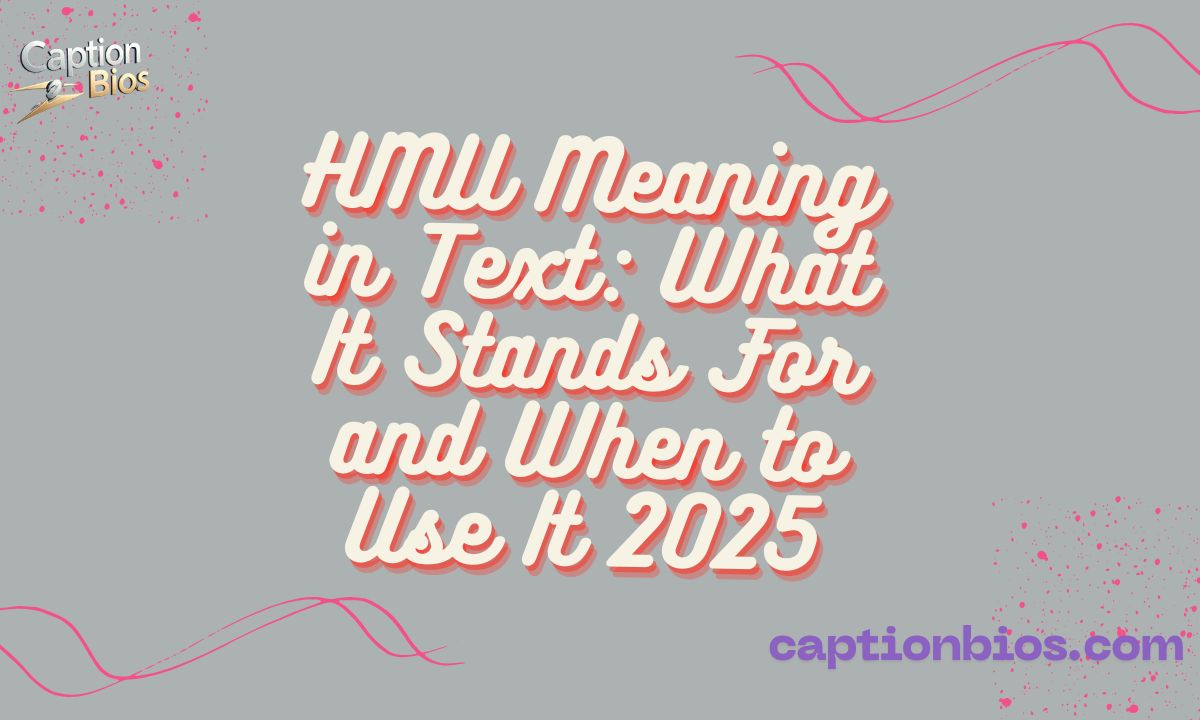HMU stands for “Hit Me Up,” which means “contact me” or “message me.” It’s a casual way to invite someone to reach out to you through text, call, or social media. This acronym is perfect for friends and informal chats but should be avoided in professional emails or formal situations.
You can use HMU when making plans with friends, staying in touch, or inviting casual conversation. However, older people or non-native speakers might not understand it, so clearer alternatives work better.
Understanding the True Meaning of HMU
To truly master the use of HMU and know when to replace it with more suitable alternatives, we need to dive deeper into what this acronym actually communicates beyond its literal translation. At its core, “Hit Me Up” conveys several underlying messages. First, it signals availability and openness.
When you say HMU, you’re telling someone that you’re receptive to communication and that they won’t be bothering you by reaching out. Second, it places the ball in the other person’s court, giving them the agency to decide when and how to contact you. This makes it less demanding than saying “Call me right now” or “Text me back immediately.”
The phrase also carries a tone of casualness and informality. It’s the linguistic equivalent of a friendly wave rather than a formal handshake. When you use HMU, you’re establishing or maintaining a relaxed, easygoing dynamic in the relationship.
When Should You Avoid Using HMU?
While HMU has become widely accepted in informal digital communication, there are numerous situations where using it would be inappropriate, unprofessional, or simply ineffective. Knowing when NOT to use HMU is just as important as knowing when it’s acceptable.
Professional and formal contexts are the most obvious places to avoid HMU. In job applications, cover letters, formal emails to superiors, client communications, or any situation where professionalism is expected, using slang like HMU can seriously damage your credibility.
It signals a lack of awareness about appropriate communication standards and can make you appear immature, careless, or disrespectful of professional boundaries. Imagine receiving a message from a job candidate that says, “I’m really interested in the position. HMU if you want to discuss my qualifications.”
Nuance & Tone: What HMU Implies About You

The language we choose reveals a lot about our personality, values, and how we want others to perceive us. When you use HMU, you’re not just conveying information—you’re also projecting an image and establishing a particular dynamic in your relationships.
Using HMU regularly signals that you’re casual, easygoing, and approachable. It suggests you’re comfortable with informal communication styles and don’t take yourself too seriously. This can be an asset in social situations, among friends, and in casual work environments where rigid formality would seem out of place.
It positions you as someone who’s “chill,” relatable, and easy to talk to. However, the informal nature of HMU can also have downsides if overused or used inappropriately. In professional contexts, it can make you appear too relaxed, potentially undermining your authority or credibility.
If you’re a manager, consistently using slang like HMU with your team might blur professional boundaries in ways that could become problematic. If you’re trying to establish yourself as an expert in your field, heavy reliance on internet slang can make you seem less serious or knowledgeable.
25 Polished Alternatives to Say “HMU” in Text
Having a diverse vocabulary for inviting communication allows you to tailor your message to any situation. Here are twenty-five thoughtful alternatives to HMU, each suited to different contexts and tones:
1. Feel Free to Reach Out This phrase is welcoming without being pushy, making it perfect for professional-casual situations. Example: “If you have any questions about the project, feel free to reach out.”
2. Let’s Catch Up Soon Ideal for reconnecting with old friends or maintaining relationships. Example: “It’s been way too long! Let’s catch up soon over coffee.”
3. Drop Me a Message Casual and direct, this works well among peers and friends. Example: “Drop me a message when you’re free to talk about the trip.”
4. Text Me Anytime Friendly and open, suggesting genuine availability. Example: “If you ever need someone to talk to, text me anytime.”
5. Contact Me When You’re Free Slightly more formal while still being flexible. Example: “Contact me when you’re free to discuss the next steps for the project.”
6. Shoot Me a Text Very casual and friendly, best for close friends. Example: “Shoot me a text later, and we’ll figure out dinner plans.”
7. Give Me a Shout Laid-back and informal with a friendly vibe. Example: “Give me a shout when you get back in town!”
8. Let Me Know When You’re Available Professional and practical, perfect for scheduling. Example: “Let me know when you’re available for a quick call to discuss the proposal.”
9. Ping Me Later Common in tech and professional environments, especially for quick check-ins. Example: “Ping me later with those file updates when you get a chance.”
10. Reach Out Whenever Open-ended and relaxed, showing no pressure. Example: “I’m always happy to help—reach out whenever you need advice.”
11. Connect With Me Later Professionally friendly, suitable for networking contexts. Example: “I’d love to hear more about your work. Connect with me later, and we can schedule a chat.”
12. Let’s Chat Soon Warm and inviting without being overly casual. Example: “I have some exciting news to share. Let’s chat soon!”
13. You Can Always Message Me Reassuring and supportive, showing consistent availability. Example: “If you’re struggling with the assignment, you can always message me for help.”
14. I’m Just a Text Away Comforting and friendly, emphasizing accessibility. Example: “Don’t hesitate if you need anything—I’m just a text away.”
15. Reach Me at Your Convenience Formal and polite, excellent for professional correspondence. Example: “Should you need any additional information, please feel free to reach me at your convenience.”
16. Send Me a Message Straightforward and neutral, works in most contexts. Example: “Send me a message once you’ve reviewed the documents.”
17. Get in Touch Classic and versatile, neither too formal nor too casual. Example: “Get in touch when you have a moment to discuss the event details.”
18. Let’s Schedule a Time to Talk Professional and action-oriented, good for business contexts. Example: “This deserves a proper conversation. Let’s schedule a time to talk this week.”
19. Call Me When You Can Direct and personal, suggesting something important. Example: “I have some updates about the situation. Call me when you can.”
20. Touch Base With Me Professional language common in business settings. Example: “Touch base with me next week, and we’ll review the progress.”
21. Drop Me a Line Slightly old-fashioned but friendly and warm. Example: “I’d love to hear how you’ve been. Drop me a line sometime.”
22. Buzz Me Casual and playful, often used among younger people. Example: “Buzz me when you’re ready to leave, and I’ll meet you outside.”
23. Get Back to Me Neutral and practical, implying response to something. Example: “Take a look at the proposal and get back to me with your thoughts.”
24. Let’s Find Time to Connect Collaborative and inclusive, good for networking. Example: “Your perspective on this would be valuable. Let’s find time to connect.”
25. I’d Love to Hear From You Warm and genuine, showing sincere interest. Example: “I’ve been thinking about what you said. I’d love to hear from you when you have time.”
Which Alternative Should You Choose?
Selecting the right alternative to HMU depends entirely on your relationship with the recipient, the purpose of your communication, and the setting in which you’re interacting. Here’s a comprehensive guide to help you navigate these choices.
For Formal or Professional Use:
In business emails, professional networking, job-related communication, or any situation where you want to project competence and respect for professional norms, choose language that’s polished and clear.
Options like “Feel free to reach out,” “Reach me at your convenience,” “Let me know when you’re available,” and “Touch base with me” strike the right balance between approachability and professionalism.
For Friendly or Casual Use:
When texting friends, chatting with peers, or communicating in any relaxed social context, you have much more freedom. Phrases like “Drop me a message,” “Text me anytime,” “Give me a shout,” “I’m just a text away,” and “Let’s catch up soon” maintain a friendly, warm tone without being overly formal.
The key here is matching the energy of your relationship and the conversation. With close friends, even something as casual as “Buzz me” or “Shoot me a text” works perfectly fine. With acquaintances or people you’re getting to know, something slightly more thoughtful like “I’d love to hear from you” or “Let’s find time to connect” shows you’re genuinely interested without being too intense.
For Social Media or Fun Tone:
On platforms like Instagram, Twitter, TikTok, or in group chats where the tone is light and playful, you can be more creative and expressive. “Give me a shout,” “Let’s catch up soon,” “Shoot me a text,” or even just using HMU itself is perfectly acceptable here.
Social media communication tends to be more performative and less personal, so matching the casual, energetic tone of the platform is appropriate. However, even in these contexts, being slightly more thoughtful can help you stand out. Instead of just commenting “HMU” on someone’s post, saying “We should definitely catch up soon!” feels more genuine and engaged.
For Romantic or Dating Contexts:
When you’re interested in someone romantically or trying to build a deeper connection, your language choice matters significantly. While HMU isn’t necessarily wrong, more engaged alternatives like “I’d love to hear from you,” “Let’s find time to connect,” “Call me when you can,” or “I’d really enjoy spending more time together” communicate interest and investment more clearly.
The problem with HMU in romantic contexts is that it can seem too casual or noncommittal, potentially giving the impression that you’re not that interested or invested. When you’re trying to build something meaningful, taking an extra moment to express yourself more fully shows care and effort.
Why Should You Replace HMU in Text?
While HMU is convenient and widely understood, there are compelling reasons to expand your communication vocabulary and choose more precise alternatives in many situations.
Demonstrates Emotional Intelligence:
Choosing your words thoughtfully based on context, relationship, and purpose shows emotional intelligence and social awareness. It indicates that you’re considering how your message will be received and adapting your communication style accordingly. This skill is invaluable in both personal and professional relationships.
Improves Tone Sensitivity:
Different situations call for different tones, and being able to modulate your language appropriately is a mark of communication competence. Sometimes you want to sound warm and friendly, other times professional and polished, and still other times casual and fun. Having a range of expressions allows you to hit the right note every time.
Increases Professional Credibility:
In work contexts, the ability to communicate clearly and professionally directly impacts how others perceive your competence. While one instance of HMU probably won’t ruin your career, consistently defaulting to informal slang when more professional language would be appropriate can limit your advancement and how seriously colleagues take you.
Avoids Confusion:
Not everyone is familiar with internet slang, especially older generations, non-native English speakers, or people who aren’t heavily engaged with digital culture. Using clearer, more standard language ensures your message is understood by everyone, regardless of their background or familiarity with current linguistic trends.
Fits the Conversation Flow Better:
Sometimes HMU just doesn’t fit naturally into the rhythm and tone of a conversation. More varied alternatives allow you to maintain conversational coherence and create more engaging, natural-sounding exchanges. It’s like having a well-stocked vocabulary—the right word at the right time makes everything flow better.
Shows Effort and Care:
Taking an extra moment to choose words that are more specific or appropriate demonstrates that you care about the interaction and the person you’re communicating with. While this might seem like a small thing, these little demonstrations of care accumulate and strengthen relationships over time.
Common Mistakes With HMU
Even people who use digital communication regularly can fall into problematic patterns with HMU and similar slang. Being aware of these common mistakes can help you avoid them.
Overusing Slang in Professional Settings:
One of the most frequent errors is failing to adjust communication style based on context. Someone might text their boss “HMU when you need that report” without realizing how inappropriate this sounds.
The casualness that works with friends doesn’t translate to professional hierarchies, and this lack of awareness can have career consequences.
Using HMU Without Context:
Simply texting someone “HMU” with no additional information is confusing and somewhat rude. HMU about what? When? For what purpose? This kind of vague communication puts an unnecessary burden on the recipient to figure out what you want.
Assuming Everyone Knows the Acronym:
Language evolves quickly in digital spaces, but not everyone keeps up with every new term or abbreviation. Assuming that everyone from your teenage cousin to your grandmother understands HMU can lead to confusion and make people feel excluded or out of touch.
Texting It to Older or Non-Native English Speakers:
Generational and linguistic gaps are real. Your seventy-year-old aunt or your colleague who learned English as a second language might be completely baffled by HMU.
This doesn’t mean you can never use informal language, but being aware of your audience and adjusting accordingly shows respect and consideration.
Using It When You Actually Want Immediate Response:
HMU implies casualness and flexibility—contact me when you can, at your convenience. If what you actually need is an urgent response, HMU sends the wrong signal. Saying “HMU about the project” when you actually need information by the end of the day creates mismatched expectations and potential problems.
Better Practice:
Always match your wording to your audience, purpose, and context. Before hitting send, ask yourself: Is this the right tone for this person and situation? Will they understand what I mean? Am I being as clear as I need to be.?
Frequently Asked Questions
What Does HMU Mean in Texting?
HMU stands for “Hit Me Up,” which means “contact me” or “reach out to me” in informal digital communication.
Is It Professional to Use HMU in Work Emails?
No, HMU is too casual for professional emails and should be replaced with formal alternatives like “feel free to reach out” or “contact me at your convenience.”
When Did HMU Become Popular?
HMU gained widespread popularity in the early 2010s through social media platforms and text messaging, evolving from online chatroom slang.
Can Older People Understand HMU?
Many older generations may not be familiar with HMU, so it’s better to use clearer language like “let me know” or “get in touch” when communicating with them.
What’s the Best Alternative to HMU for Friends?
For friends, casual alternatives like “text me anytime,” “drop me a message,” or “let’s catch up soon” work well while sounding more thoughtful.
Conclusion
Understanding HMU and its appropriate usage is more than just knowing what three letters stand for—it’s about developing communication intelligence in an increasingly digital world. While “Hit Me Up” has earned its place in casual conversation and informal texting, truly effective communicators recognize that one size doesn’t fit all.
The ability to adapt your language to different contexts, audiences, and purposes is what separates adequate communication from exceptional connection. Whether you’re networking professionally, maintaining friendships, building romantic relationships, or navigating family dynamics.
Muhammad Shoaib is a creative writer with over 5 years of experience crafting impactful captions, memorable quotes, and clever pick-up lines that spark engagement and emotion. As the lead content expert at CaptionBios.com, Shoaib helps people express themselves with style, humor, and authenticity across social media and messaging platforms.






Leave a Reply